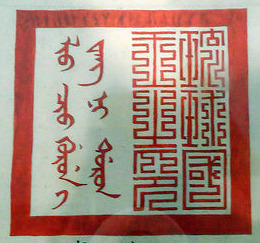Manchu language

The Manchu language was one of the two official languages of China's Qing Dynasty, being used alongside Chinese on most, if not all, official documents.
The language evolved as a purely oral language, only first becoming a written language in 1599, when the Mongolian script was adopted. Written vertically, the Mongolian script evolved out of the Uighur language (also written vertically), which in turn derived from Sogdian (written horizontally), which in turn came originally out of Aramaic. Thus, while Manchu and Mongolian both are, of course, quite far removed from Greek, Latin, Hebrew, Arabic, and other European & Middle Eastern languages which also share Aramaic roots, Manchu and Mongolian can nevertheless be said to be all but completely unrelated to Chinese.
References
- Albert M. Craig, The Heritage of Chinese Civilization, Third Edition, Prentice Hall (2011), 116.